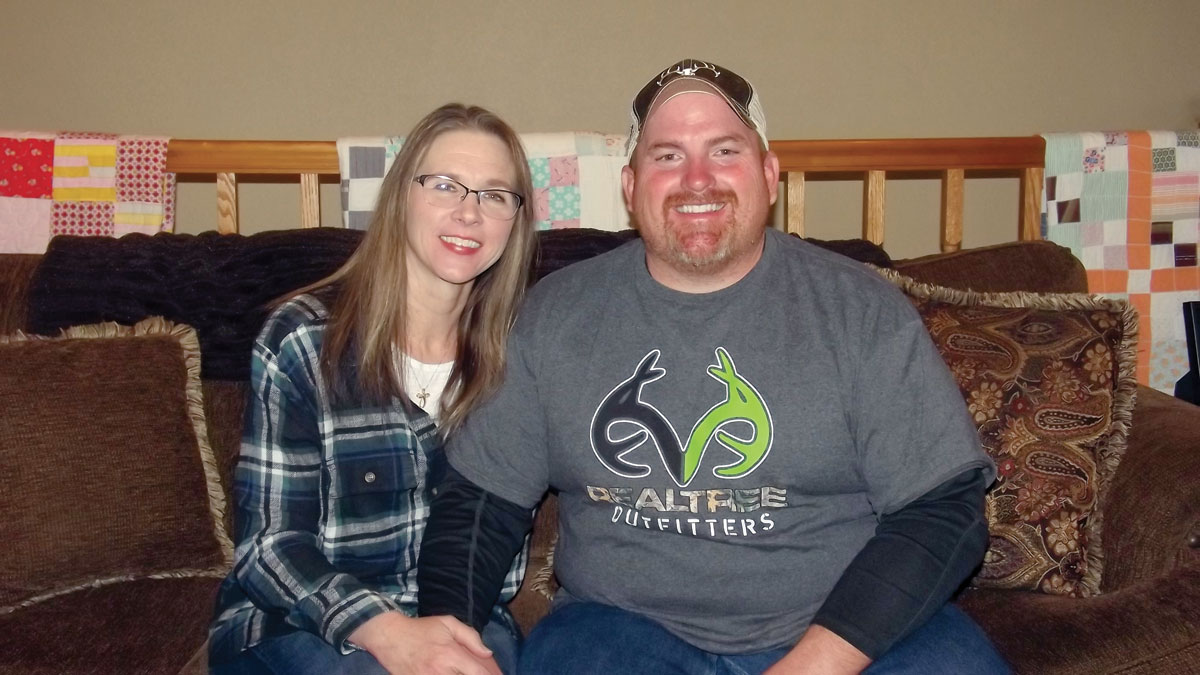
Reggie and Missy Rice have incorporated laying hens and Katahdin sheep into their Dallas County, Mo., farm
Lifelong Buffalo, Mo., residents Reggie and Missy Rice started a pasture reared, 10,000 hen egg business in 2016.
They also have a flock of Katahdin sheep to produce meat for the seasonal lamb market and efficiently use their 80 acres.
Reggie, 45, grew up on a farm which was a dairy and where his parents now raise chukar, an upland gamebirg. He is currently in sales. Missy, 43, was from town and is a registered nurse.
As their two children, Austin, 20, and Emily, 17, got older, Reggie and Missy decided they wanted their own business.
“We became aware of the Vital Farm egg production program through some of our Mennonite contacts and decided to become a Vital Farm producer,” Reggie said. “We had two, 5,000 hen, automated barns built to Vital specifications by Hostetler Construction in Buffalo; fenced eight paddocks with shade shelters for each barn; and signed a five-flock contract with Vital. We use about 36 acres of our 80 acres for the hens.”
“Each paddock provides 108 square feet of space and one-quarter foot of shade per hen. We rotate the hens among the paddocks every three weeks,” Missy said. “After we completely cleaned, disinfected, and re-bedded our barns, we got our second flock of hens in February. The hens stay in the barns for a short time so that they get used to humans and learn where their feed, water and nest boxes are.”
Missy works from home and does most of the socializing and acclimating of the hens.
“We have large rubber balls and bales of hay suspended from the ceiling so that the hens can eat and peck at something other than each other,” Missy said. “Just as soon as they are ready, the hens go outside from three hours after sunrise to sunset and we make sure they are all inside before closing the doors.”
Vital uses a breed that lays large, brown eggs. The hens thrive on a combination of a natural diet, exercise and carefully formulated feed.
“We can expect in excess of 300, high-quality, large eggs per bird. We are able to operate a sustainable, profitable business which encourages us as producers,” Reggie said. “We buy our flock from a Vital-approved pullet producer. We keep daily records on the flock and send a report to Vital each week. Vital uses the information to adjust the feed formula to optimum levels. We buy our feed mixed to Vital’s specifications from Hostetler Feed in Buffalo. Vital buys the eggs from us and picks them up weekly.”
While they are in the “egg business,” the couple wanted to utilize the remainder of their property as well.
“After doing some research, we decided on Katahdin sheep, a meat breed that does not have to be sheared,” Reggie said. “We have six ewes and a ram right now and 10 lambs on the ground.”
“We want to increase our flock to about 40 ewes so that we can plan lambing for the seasonal demands for the meat,” Missy said.
The Katahdin is a breed of domestic sheep developed in the state of Maine by Michael Piel. He imported St. Croix sheep chosen by Dr. Richard Marshall Bond, then director of the Virgin Islands branch of the USDA, and crossed them with a variety of breeds including the Suffolk. Piel wanted a wool less, easy care, meat type sheep, that would be naturally tolerant of climatic extremes and capable of high performance in a wide variety of environments.
The Katahdin has a hair coat that does not need to be sheared, meat-type conformation, high fertility and strong maternal instincts. The coat can be any color and polled animals are preferred, but horned and scurred animals exist.
The Katahdin is a medium-sized breed that adapts to many management situations, handles a wide range of temperature and humidity, and does well on a variety of feed and forage resources. Ewes have a high potential for early puberty, are very fertile, are easy lambers that usually produce twins, exhibit strong maternal instincts, and produce plenty of milk. Katahdin lambs grow rapidly, mature to an acceptable market weight quickly, and produce relatively lean, well-muscled carcasses with a mild flavor.
Reggie and Missy manage all aspects of the work with the hens and sheep, but have some part-time help to collect eggs in the daytime. Their short term goals are to successfully meet their five-flock contract, which covers approximately 70 months, and to establish a market for their lambs. They look forward to another contract with Vital, possibly expanding production, and growing a business that will allow them to work full time on the farm.






